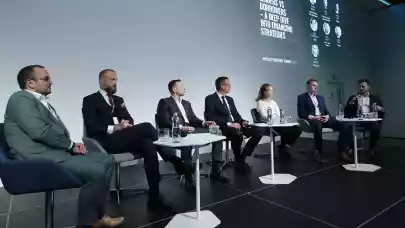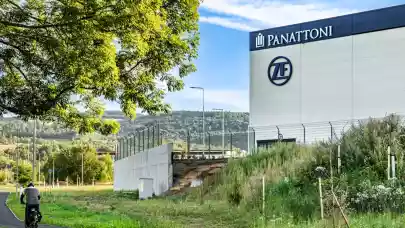
The Czech property investment market has been quite quiet during the past months. Sales are rare; banks are taking a rather conservative approach to potential investments and transactions, which is coming across the real estate market. The first panel discussion of last week‘s Prague Property Forum 2024 dived into financing strategies and options for market awakening.
Dieter Knittel, Head of CEE at Deutsche Pfandbriefbank, the panel moderator, opened the discussion with a question about the level of transactions on the market. Josef Malíř, Executive Director, Star Capital Finance confirmed that spring months are quite promising in terms of pipeline. „However, there is a wide gap between what owners ask and accept and what the potential buyer is willing to offer,“ he pointed out.
Lenka Kostrounová, Director of Real Estate Finance at ČSOB, added that their bank was a little bit more cautious than the year before and keeps applying a conservative structure towards investors.
Speaking on behalf of private lenders, David Musil, CEO at Upvest, explained that their approach was not more aggressive than the one from bank circuits. „We take a holistic approach to the capital structure to see if it is defensive enough. We step into the project later when it has 50 -55% of a presale, we are more aggressive in governance, but we are offering higher leverage. And the higher the leverage the more attractive return for investors.“
Dieter Knittel then diverted the discussion to focus on retail assets. Josef Malíř explained that first-generation shopping centres still had good potential. „It is not just about buying a product any more these days, it is about services. Moreover, they are in good locations in the cities, which is an attractive investment opportunity.“
Moving on to the residential market, which has gone through tough times, panellists revealed that bank financing of this asset class depends on feasible project economics. Jakub Korf, Group CFO at Trigema confirmed: „A reliable project with feasible budget estimate combined with the ability to prepare a project documentation in compliance with EU always makes negotiation with banks easier. That is the inevitable trend.“ Difficult times force investors to be more creative. „You need to decide what project and when to start carefully. For each option you create you make a calculation and have a few alternatives. Some investors decide to postpone or even stop their projects,“ explained Jakub Korf.
Speaking about the residential segment and bank financing, Lenka Kostrounová reiterated the cautious bank approach: „For us, a diversified portfolio is important: newly constructed and ESG-related office, definitely logistics and a small part of the residential portfolio.“
Jiří Vančura, Director of Real Estate and Corporate Finance at Trinity Bank, admitted that about 60% of their current portfolio was residential development. „We focus on big cities. We believe in this market and we believe that there is demand.“
Similar to comparing big cities to other regions is crossing the border and looking for opportunities in neighbouring countries such as Germany or Poland, suggested Dieter Knittel.
As Josef Eim, Vice-Chairman of the Board at Českomoravská Nemovitostní, explained: „We have never been forced to go abroad. As long as we were able to find a good quality product in Prague, we wanted to stay a local investor.“
Josef Malíř confirmed that there was a lot of liquidity in Prague and the Czech Republic. „Also Prague’s office market vacancy is extremely low, around 7%, compared to 15-20% in New York. In an office from our portfolio, we have 96% occupancy,“ he highlighted. Speaking about Poland, the market of 40 million people promises a big consumption. „It works for logistics, for offices, and also for retail,“ he agreed on potential expansion for transactions.
Regarding market outlooks, Jiří Vančura saw a rising optimism: „It is based on the predictions that the interest rates will go down. On the other side, the market was always much more optimistic than what happened in terms of time.“ Jakub Korf shared this cautious optimism and concludes: „Volume of mortgages provided increases month to month. So there is a bright future full of challenges.“



